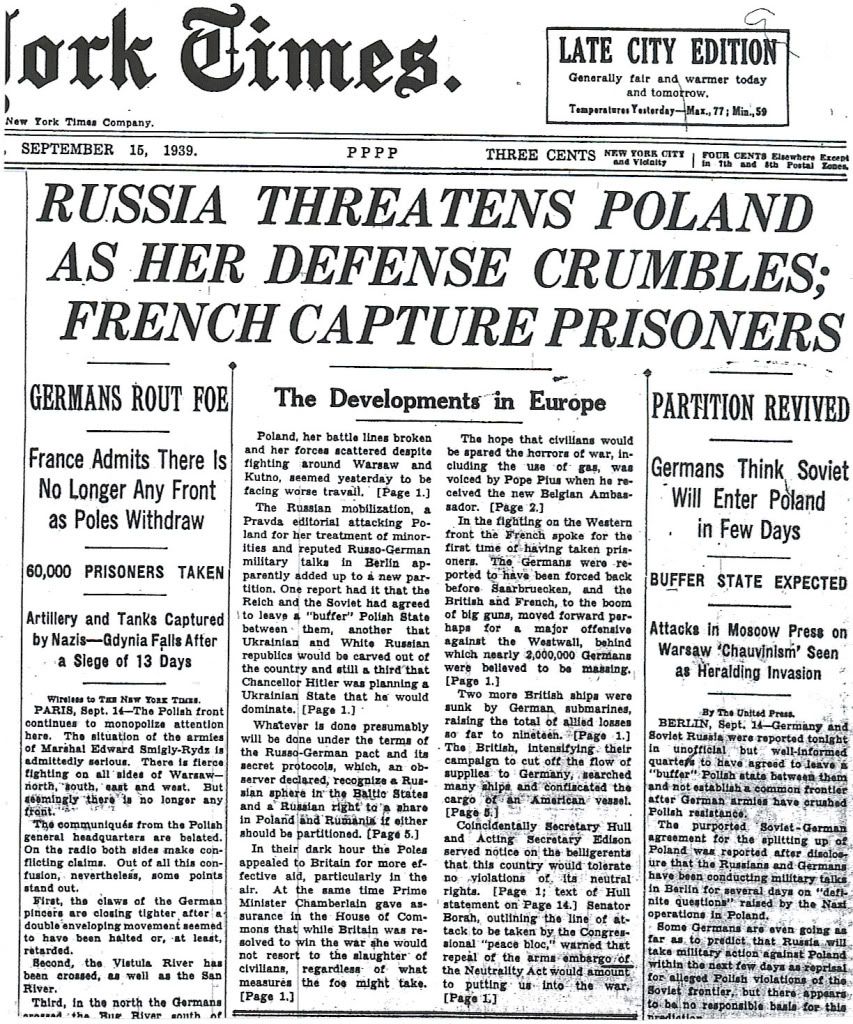
Posted on 09/15/2009 5:14:01 AM PDT by Homer_J_Simpson

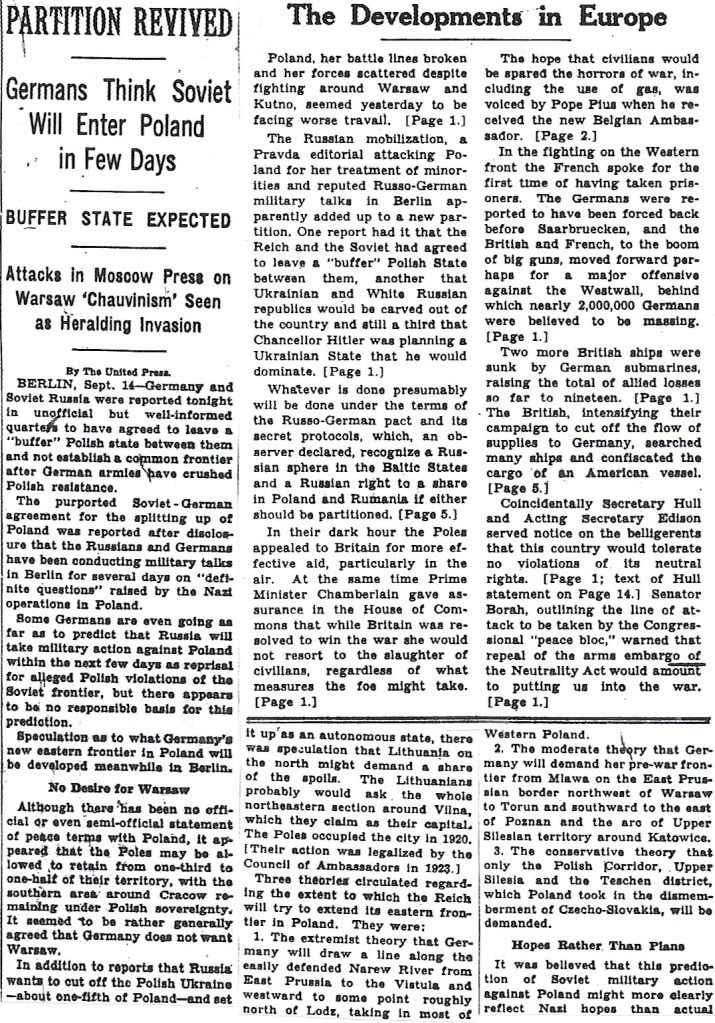
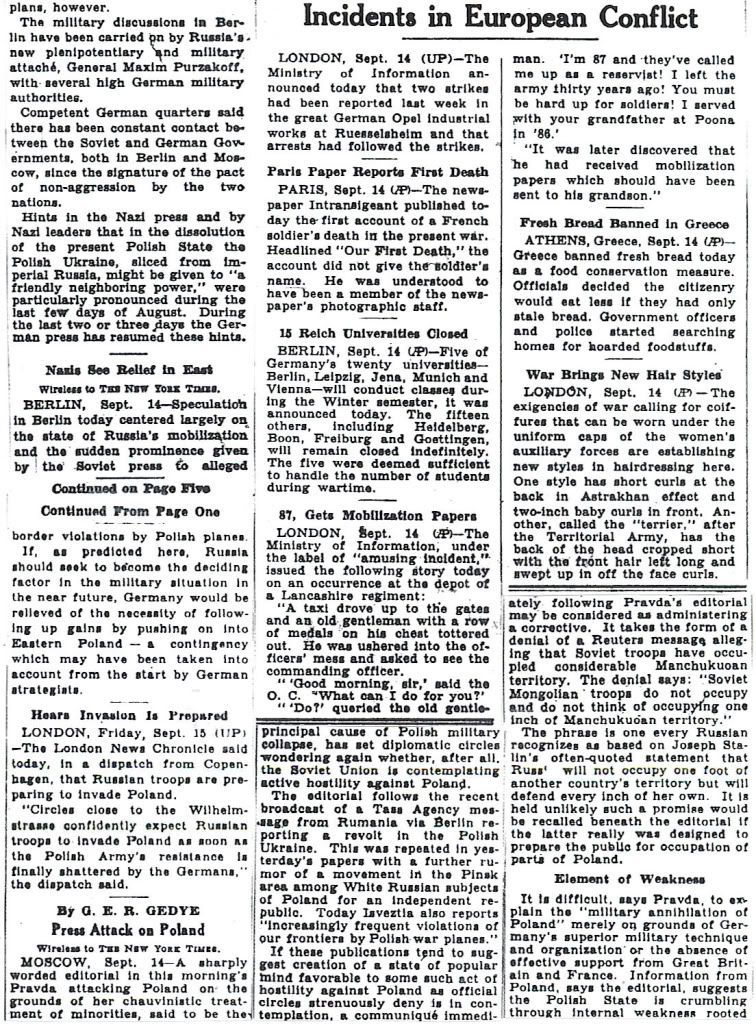
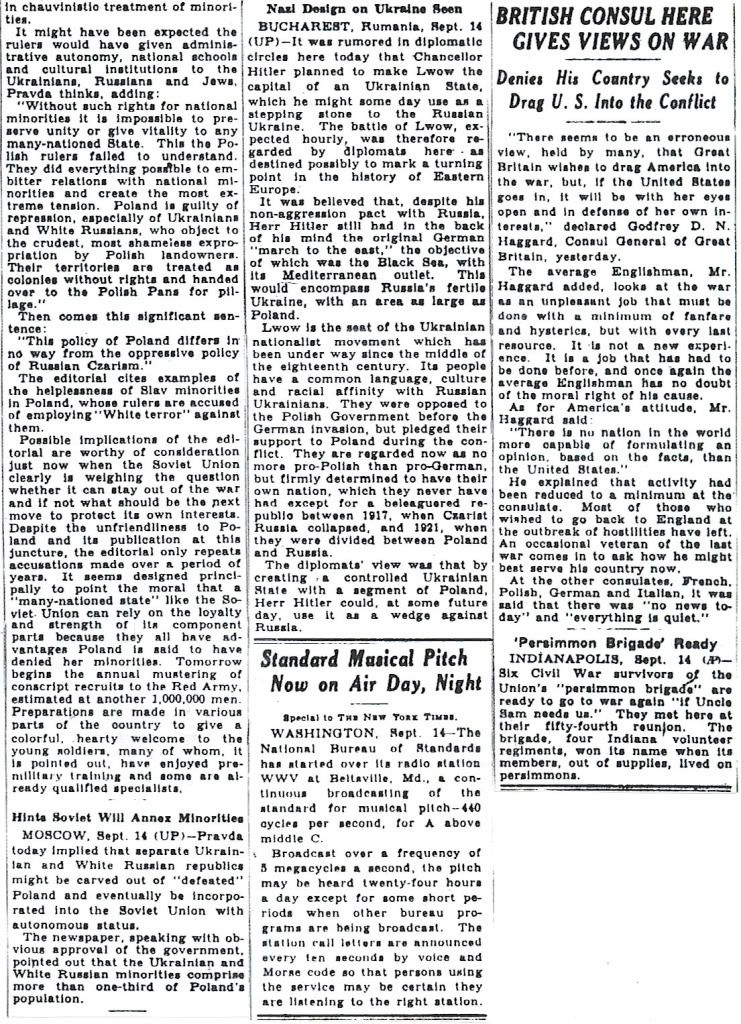
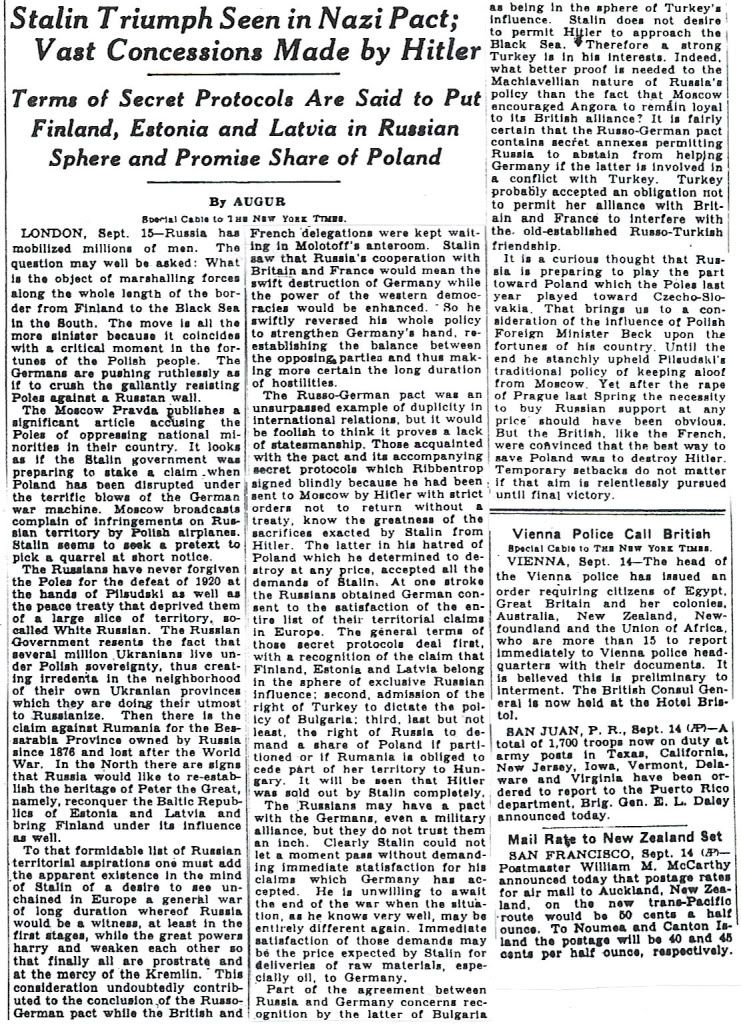
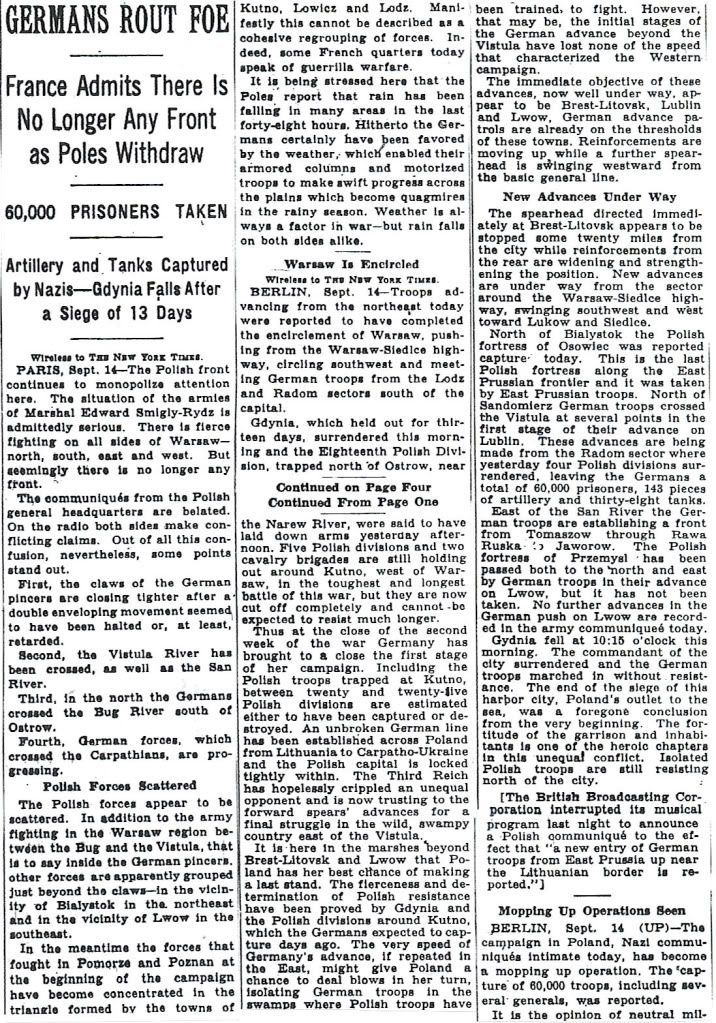
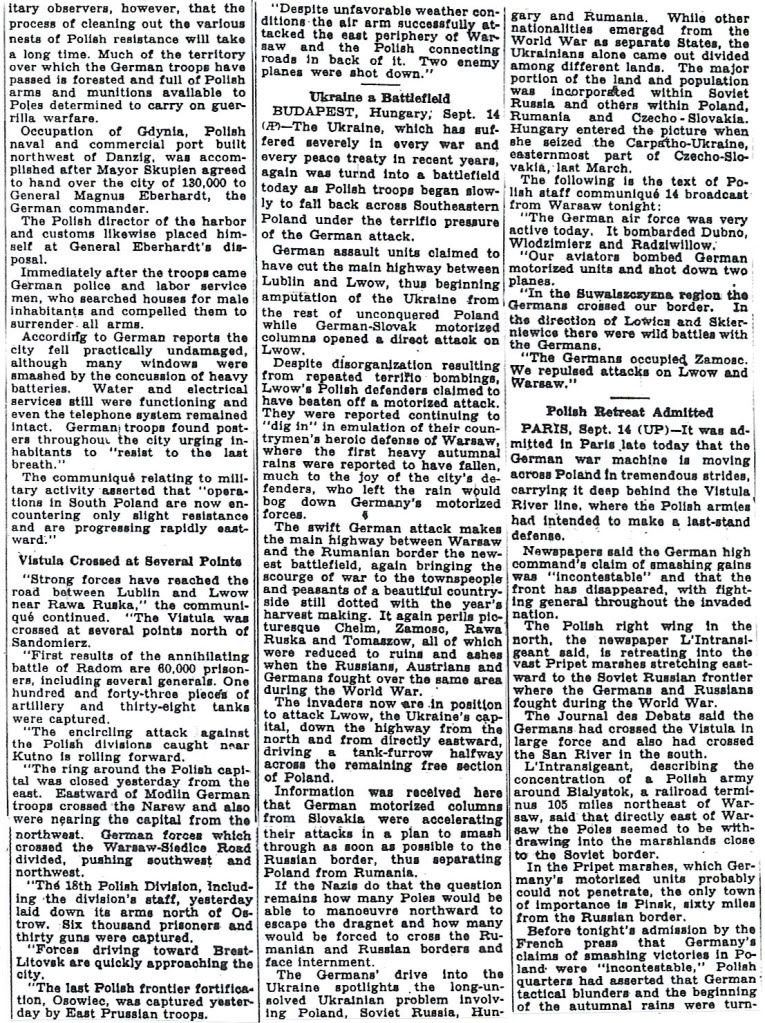
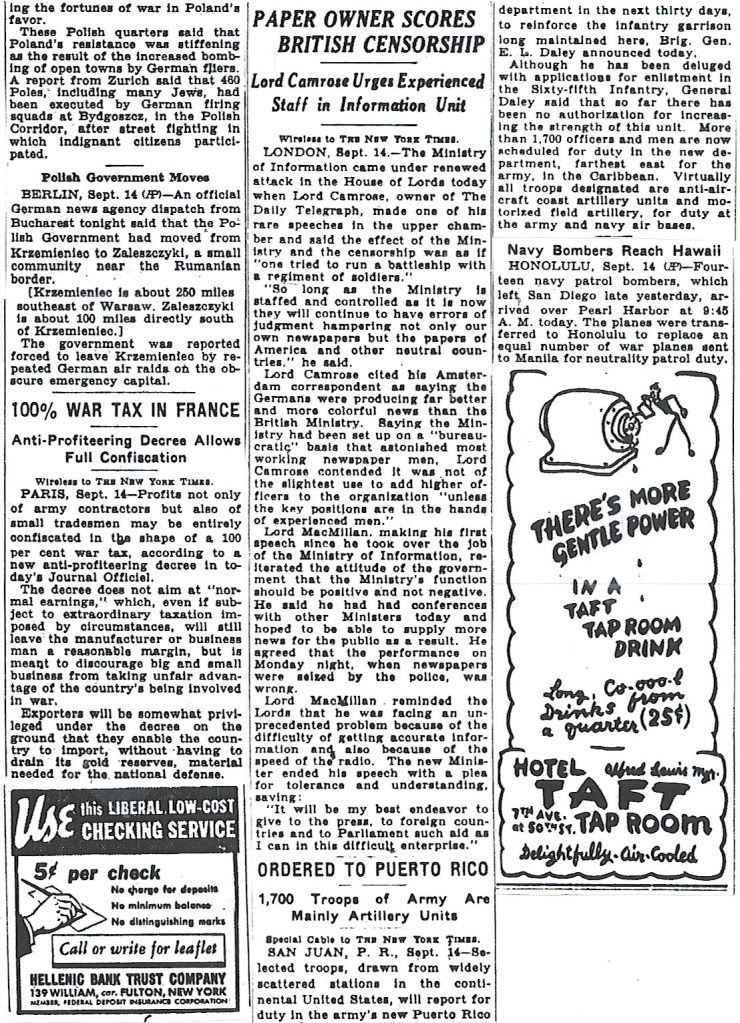
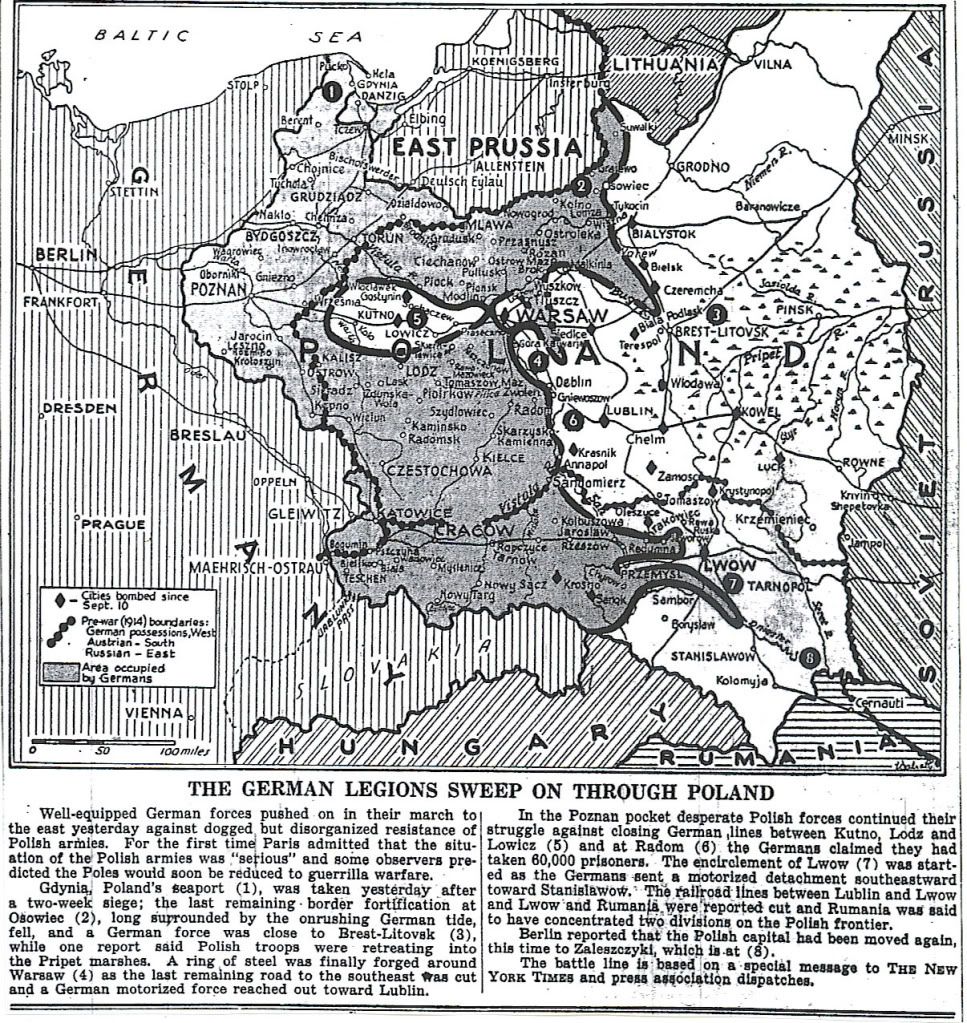
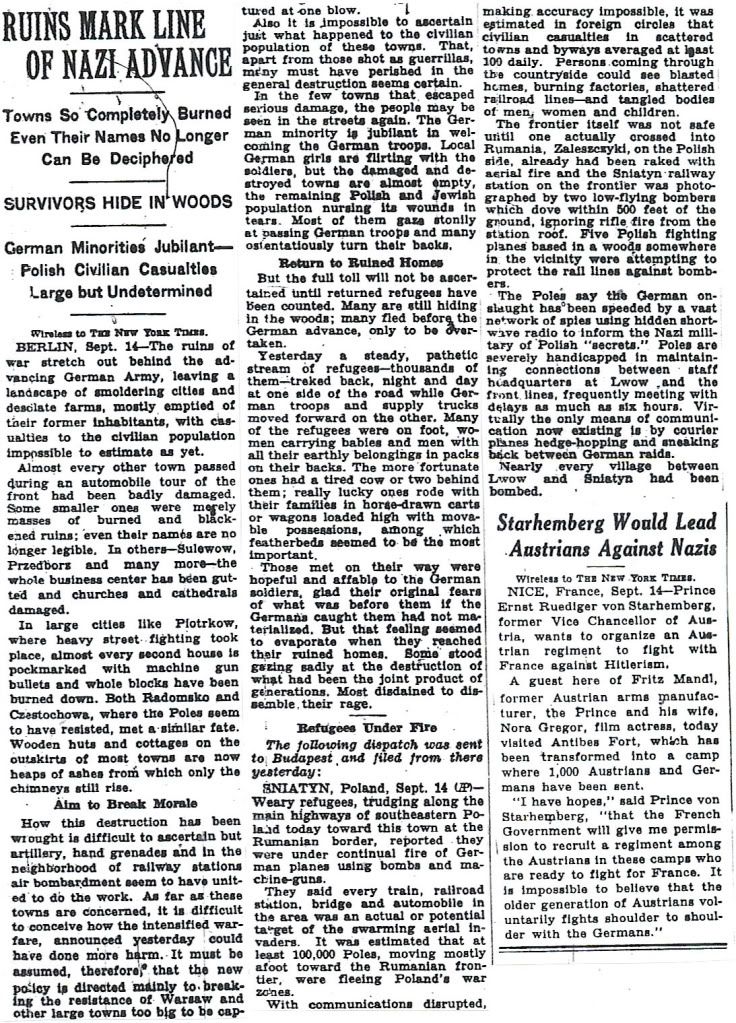
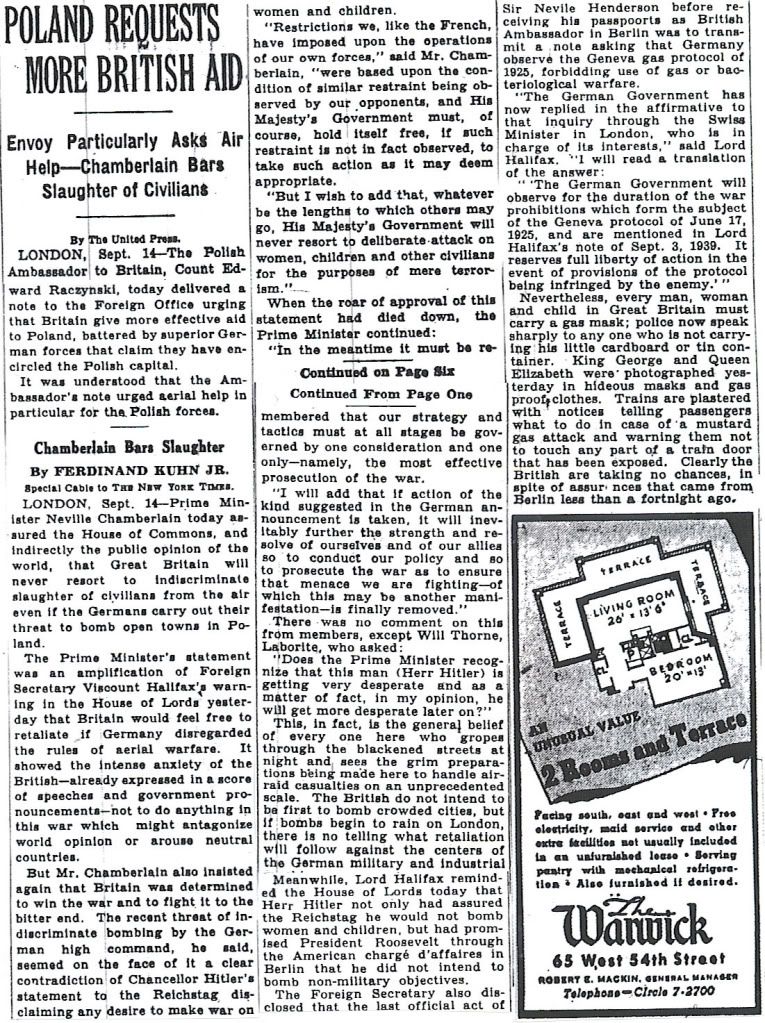
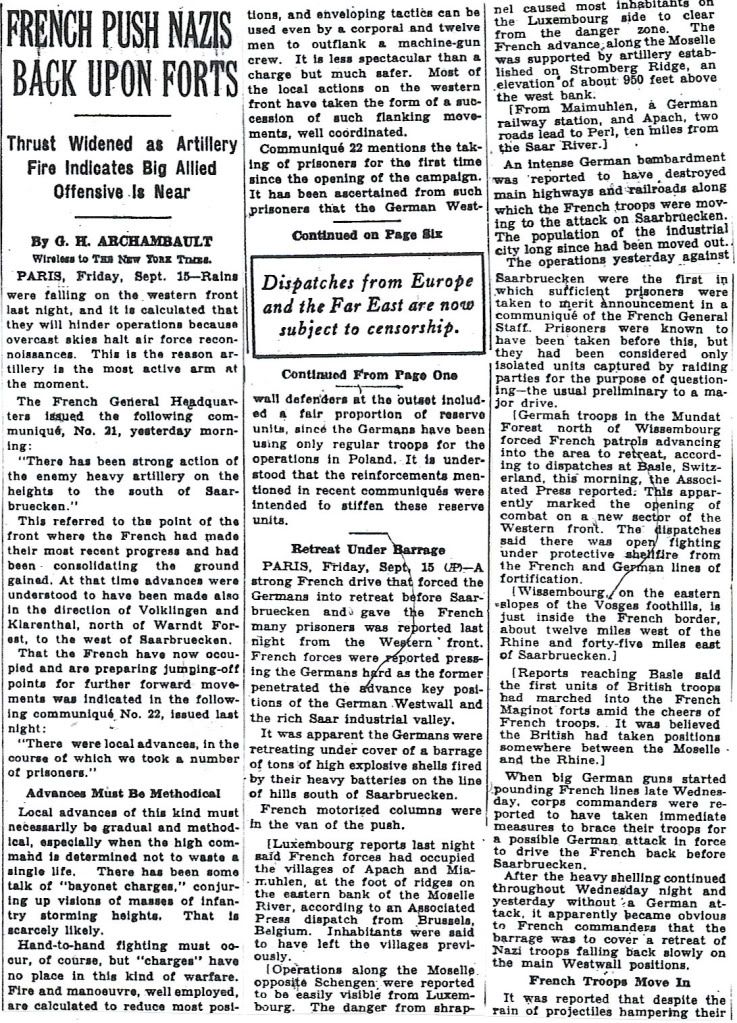
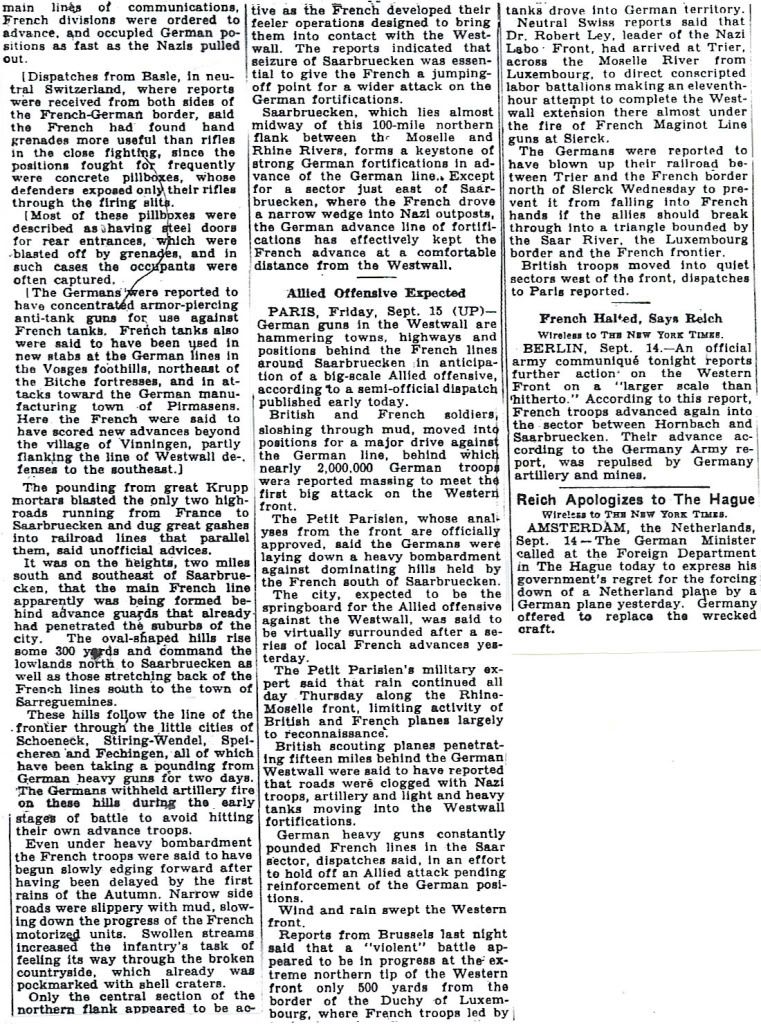
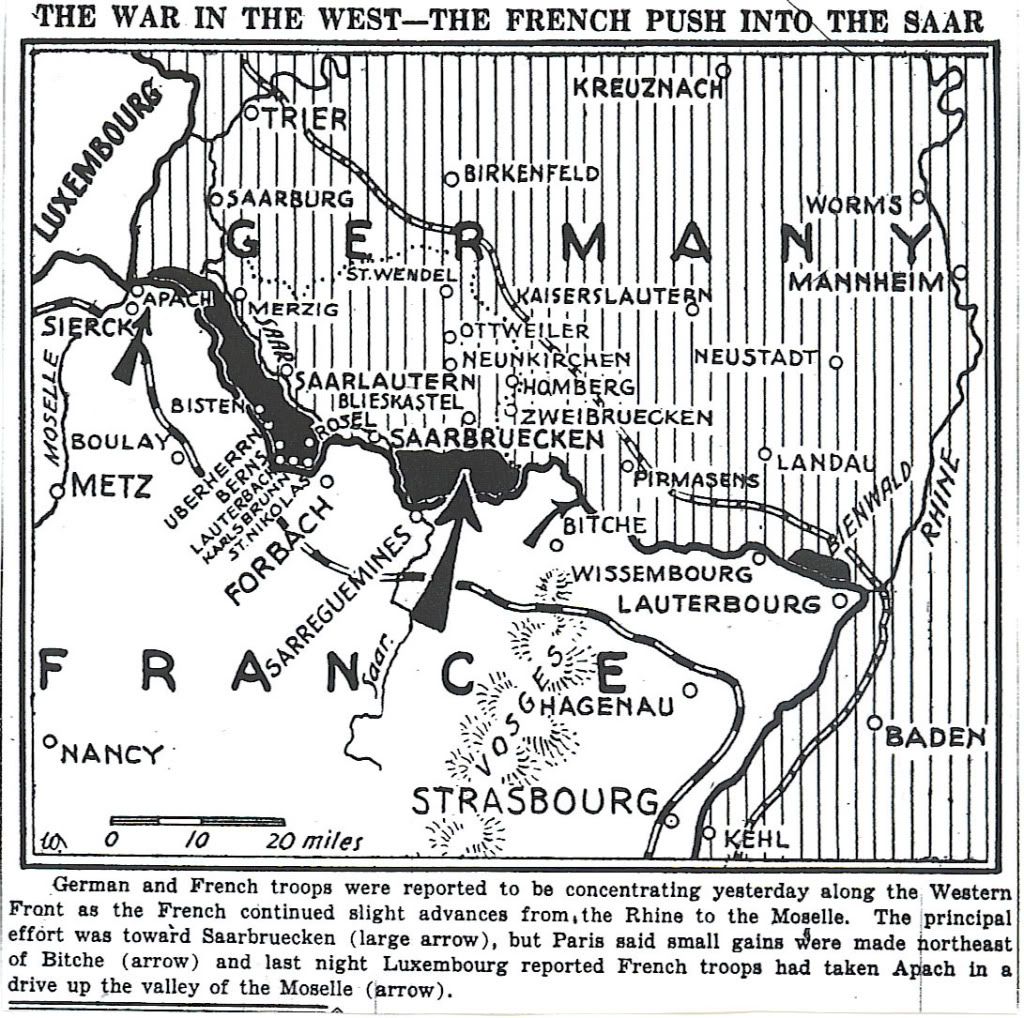
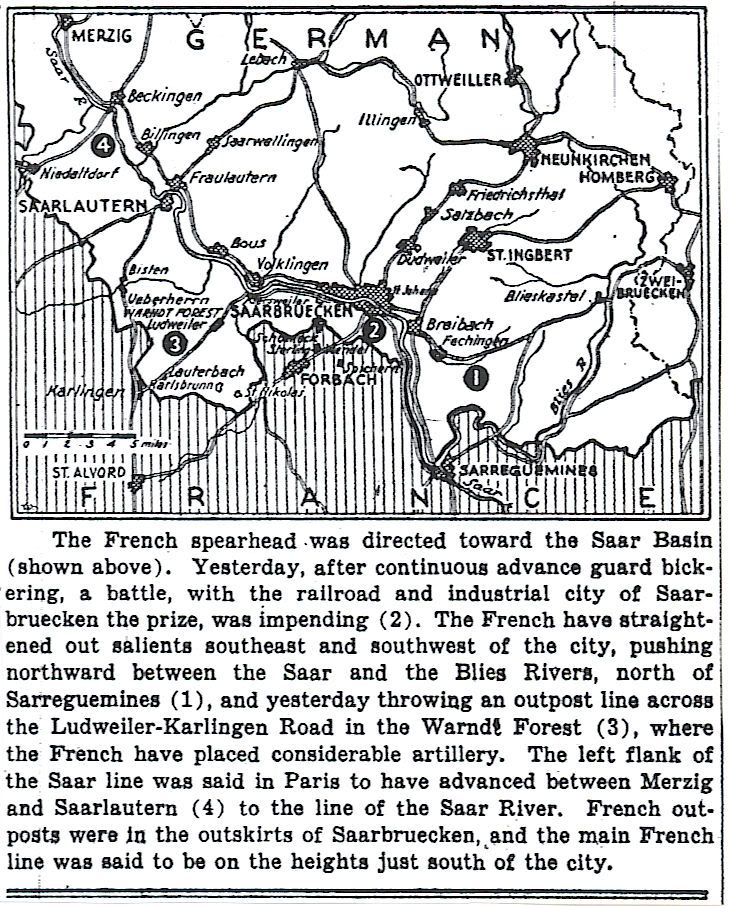
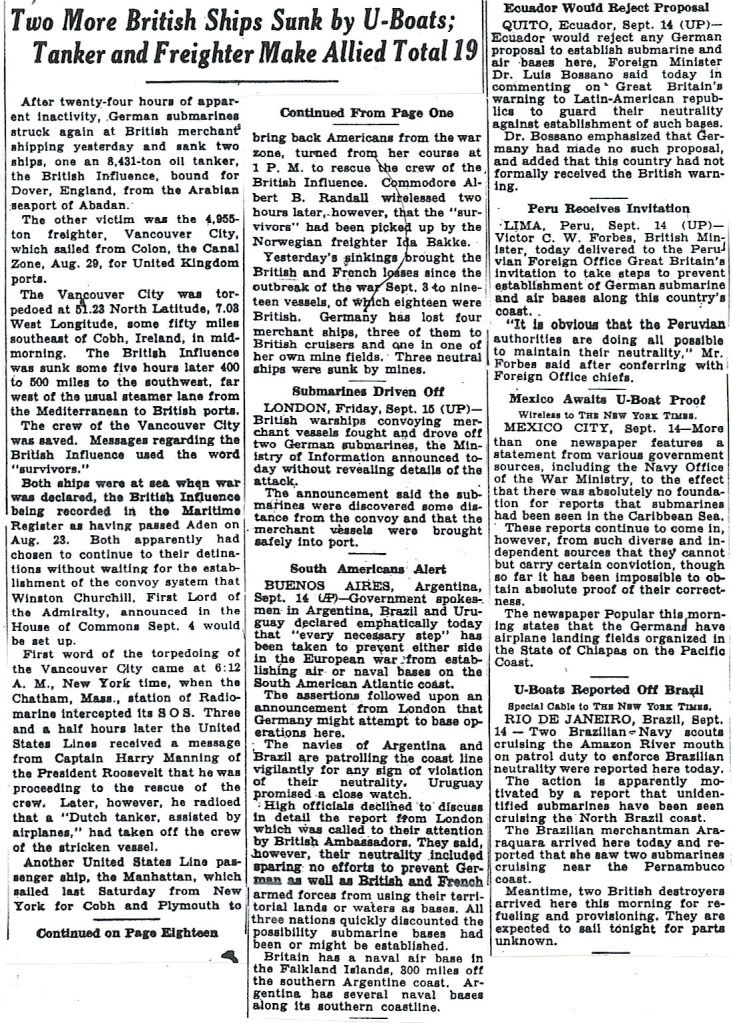
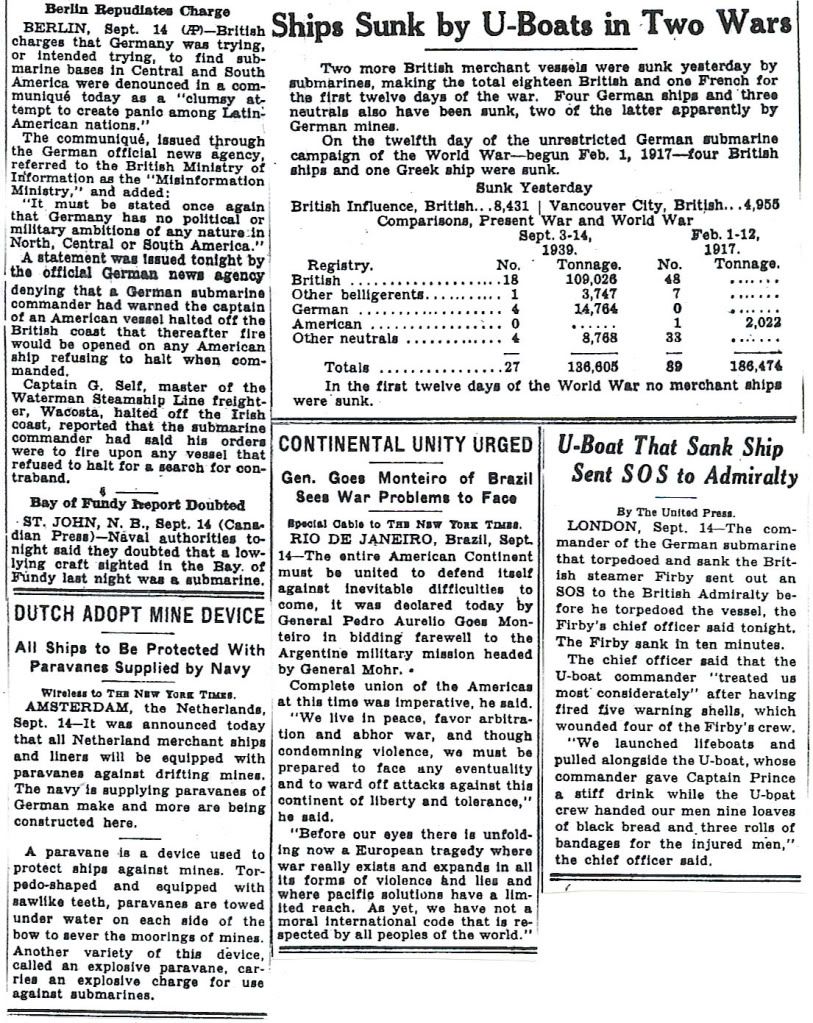
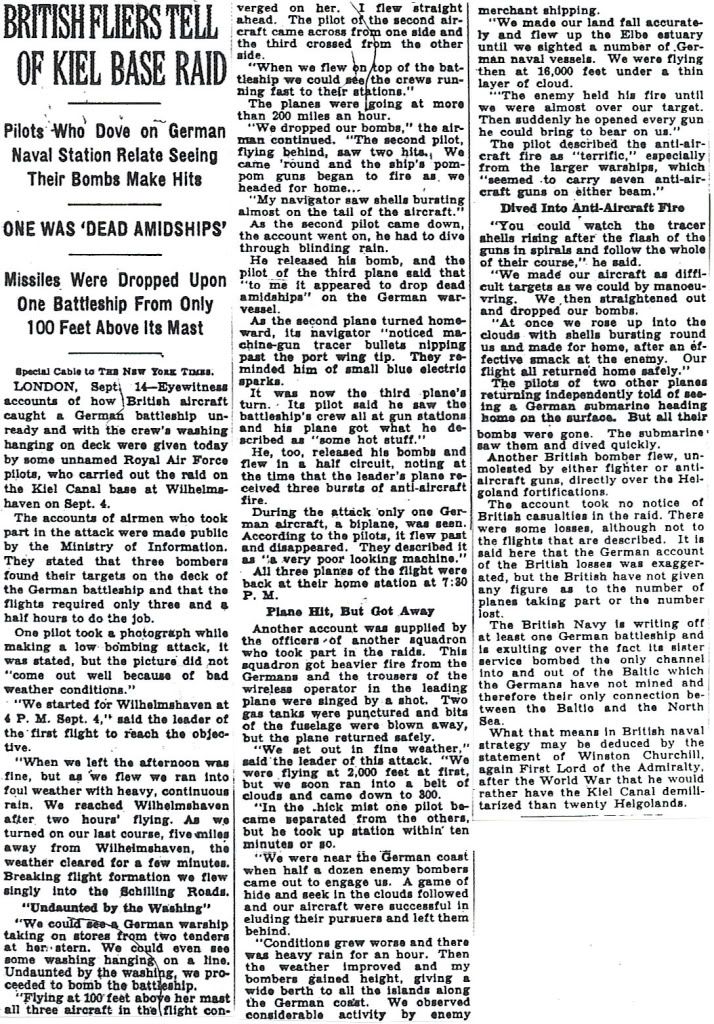
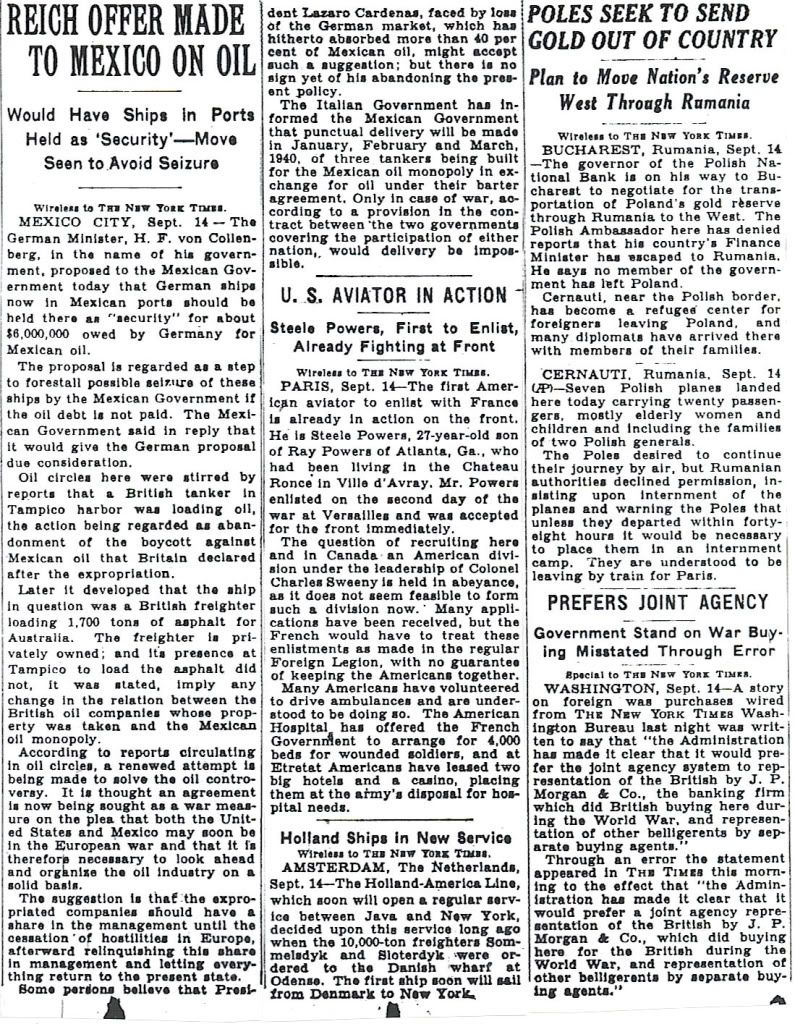
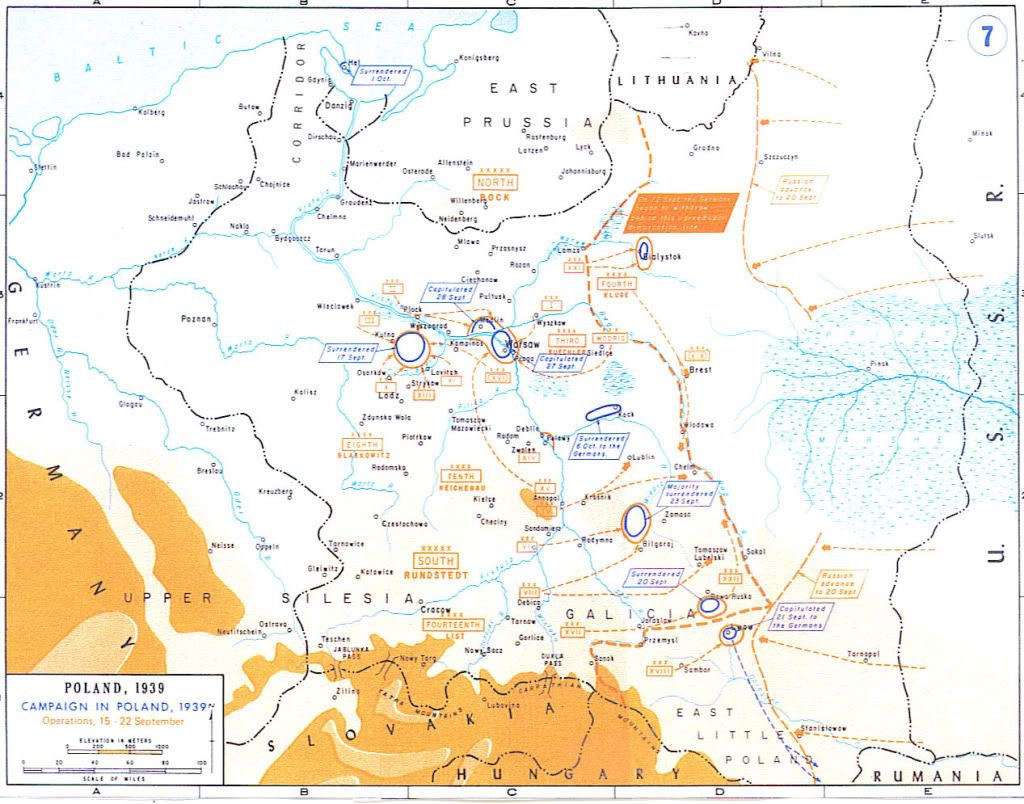
This map will be posted on my profile. A key to the map symbols is also on my profile.
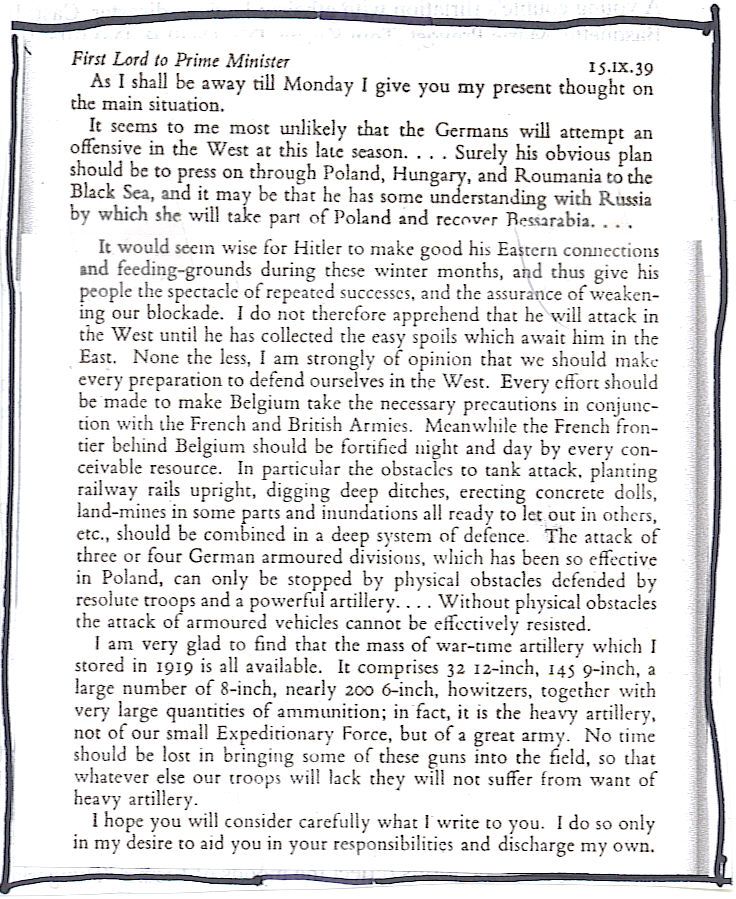
Winston S. Churchill, The Gathering Storm
Prescient thoughts by Churchill.
That 100% War Tax worked out real well for France, didn’t it?
btt
Interesting early analysis of the strategic part of the Hitler-Stalin Pact by “Augur”. Anybody know who this person was? Seems very informed.
Somebody came up with the link below a while back. He is sort of a hit-or-miss guy. Sometimes he has the straight poop, sometimes not.
This guy sounds like Reilly “Ace of Spies”. I bet they knew each other. How many Russian Jewish exiles familiar with foreign affairs were there, after all?
The German Campaign in Poland: September 1 to October 5, 1939
Prepared under direction of the Chief of Staff
United States Government Printing Office Washington: 1942
d. Phase IV: September 15-20-Annihilation of Polish armies and Russian invasion (map No. 2).
(1) Fourteenth Army (List).--On the evening of September 14 the center group of the Fourteenth Army had flung a thin outpost line around three sides of the city of Lemberg-north, west, and south. The right wing of the army still stood motionless around Sambor, a town in the Carpathian foothills, which it had reached on the 12th.
The Polish forces in Galicia, half demoralized by their long retreat and weakened by straggling and loss of prisoners, stood in two main groups. The larger, composed of the 5th, 6th, 21st, 22d, and 23d Divisions and an armored brigade, was slowly withdrawing northeastward, and by the 15th was along the San River southeast of Sandomierz. The smaller group, made up of the 11th and 24th Divisions, lay between Przemysl and Lemberg. Serious fighting began on the 16th between the left wing of General List's army and the large Polish group of five divisions and an armored brigade, whose possible withdrawal to Rumania had been intercepted by German armored troops who had reached the region between Zamosc and Chelm.
The battle began in the vicinity of Bilgoraj, a town 80 miles northwest of Lemberg and 40 miles east of Sandomierz. The conflict here continued until about the 20th, when 60,000 Polish troops surrendered and 130 cannons were captured. Remnants of the Polish Army, including the 5th Division, escaped the German net and fled eastward until they fell into the hands of the advancing Russians.
On the 17th occurred the fruition of the German plan for the great outer double envelopment around the Polish armies. At Wlodawa scouting elements of the motorized reconnaissance battalions of the Fourteenth Army established contact with similar units of the Third Army advancing south from Brest Litovsk. However, the situation that was crystallizing in a tight encirclement between Kutno and Warsaw made this outer ring unnecessary and of no great importance. Less is known of the fate of the original Polish Przemysl Army Group, but 10,000 of its men were captured near Rawa Ruska on the 18th.
Russian forces began an invasion on September 17, and by the evening of the 20th Soviet units were on the eastern outskirts of Lemberg.
(2) Tenth Army (von Reichenau).--The right group of the Tenth Army regrouped itself on September 15, and the forces that took Radom and Zwolen crossed the Vistula and advanced toward Lublin. Deblin, an obsolescent ring fortress, was taken on the 16th, together with its undestroyed Polish air depot with 100 airplanes. On the 17th Lublin was captured and on the 18th advanced elements reached Krasnystaw, a point from which they were able to assist the Fourteenth Army in forcing the surrender of the Polish southern armies at Bilgoraj.
The Tenth Army's part in the battle between Kutno and the Bzura will be dealt with in the operations of the Eighth Army.
(3) Eighth Army (von Blaskowitz).--The concentric attack of the German armies on the surrounded Polish forces hemmed in between Kutno on the west and Blonie in the east, and between the Vistula in the north and the Bzura in the south, began on September 15. The entire Eighth Army exerted its whole might from the south against the line of the Bzura. The major part of the Tenth Army's left wing attacked from Warsaw in a westerly direction. Simultaneously the III Corps of the Fourth Army advanced southeastward from Wloclawek toward Kutno. Other forces of the Fourth Army held the north bank of the Vistula from Plock to Wyszogrod, barring a withdrawal there.
Under German thrusts from all directions the resistance of the Polish forces rapidly crumbled. The Polish Army appeared to have been exhausted and partly demoralized by its courageous but fruitless attempts to break out of the German ring. Continued bombing attacks contributed their part to this break-down.
Kutno was captured on the 16th by the III Corps of the Fourth Army. On the same day the Eighth Army crossed the Bzura and the Tenth Army gained ground in the direction of Sochaczew and Lowicz.
The final disintegration of the Polish Army began on the 17th. It had been pressed into a very narrow area, southeast of Wyszogrod, between the Vistula and the Bzura. Isolated units began to surrender, and on the 19th the last of the Polish troops in this area gave up their arms. An official German communique on September 21 claimed that 170,000 men were captured, one of the largest surrenders in military history. One German army captured 320 guns and 40 tanks, according to the communique, but no complete statement of booty has ever been issued by the German High Command.
Polish prisoners taken in the battle of the Bzura belonged to the 2d, 4th, 10th, 13th, 14th, 15th, 16th, 17th, 25th, 26th, 28th, and 30th Divisions. The larger part of three cavalry brigades was also captured.
(4) Fourth Army (von Kluge).--While the III Corps of the Fourth Army was playing an important role in the annihilation battle on the Bzura, the II Corps established a tight blockade west, north, and east of the fortress of Modlin. The actual siege was begun on September 19 by a special army group under General of Infantry Strauss.
On September 15 elements of the Fourth Army occupied the port of Gdynia in the Corridor.
(5) Third Army (von Kuechler).--The Third Army intensified its siege of Warsaw, closely blockading the suburb of Praga, east of the Vistula. Several attempts by Polish forces to break out of the capital failed, and in one effort, southeast of Praga, on September 16, the Germans captured 8,000 prisoners and 126 guns. But owing to the firm and courageous attitude of Polish authorities, all efforts by the German High Command to induce Warsaw to surrender failed. East of Warsaw the 1st Polish Division tried to escape to the southeast, but just southeast of Siedlce it was forced to surrender 12,000 officers and men, 80 guns, and 6 tanks. However, some few minor elements escaped to the east.
Bialystok was captured on the 15th by the 23d German Division, which was one of the group that had been assembled in the area Lyck-Johannisburg in East Prussia for the operations in eastern Poland.
The Russian invasion from the east resulted in the capture of Molodeczno and Baranowicze on September 18 and, on the 20th, of Vilna, principal city of northeast Poland. Nowhere did the Poles resist the Russians effectively, and they offered no opposition at all at Vilna.
(6) Air operations.--The air operations during this phase were considerably less extensive than before. Polish concentrations in the regions east of the Vistula were bombed and so were the airfields adjoining the Russian border. The last remaining Polish radio stations at Vilna and Baranowicze were destroyed.
The German Air Force also played an important role in the last phase of the battle of the Bzura, bombing troop units and contributing to their demoralization.
NAVAL EVENTS-Friday, 15 September
Western Atlantic - Canadian destroyers FRASER and ST LAURENT arrived at Halifax for escort duties.
Kingston, Jamaica-UK (KJF) convoys - the first of the series, KJF.1, sailed with light cruiser ORION as escort from the 15th to 17th.
The series only continued until 8 October 1939 with three more KJF’s leaving Kingston, all unescorted - KJF.2 departing 22nd and arriving 6 October, KJF.3 departing 29th and arriving 14 October, and KJF.4 departing 8 October and arriving 22nd.
Northern Patrol - light cruiser DUNEDIN departed Scapa Flow for Northern Patrol duties and arrived back on the 18th.
British northern waters - battleship NELSON departed Loch Ewe on the evening of the 15th, escorted by destroyers SOMALI, MASHONA, MATABELE and arrived at Scapa Flow next morning.
Destroyer FURY, which had departed Scapa Flow on the 14th escorting battleship RODNEY, joined aircraft carrier ARK ROYAL at sea on anti-submarine patrol.
Heavy cruiser NORFOLK departed Scapa Flow.
Anti-aircraft cruiser CALCUTTA departed Scapa Flow and arrived back on the 16th.
British east coast/North Sea – U.36 sank steamer TRURO (974grt) 130 miles ENE of Rattray Head. Survivors were picked up by a Belgian trawler.
British aircraft bombed a submarine contact 60 miles east of Aberdeen. Destroyer SABRE was already hunting in the area and was joined by destroyer FORESIGHT, which had departed Scapa Flow on the 16th.
Destroyer BROKE attacked a submarine contact off Flamborough Head.
Light cruiser NEWCASTLE relieved light cruiser SHEFFIELD for duties with the Humber Force, although SHEFFIELD continued in the 18th Cruiser Squadron for another week.
Destroyers JERVIS, JAVELIN, JERSEY, JUPITER departed the Humber to search for a reported damaged German submarine in the North Sea. There was no contact, and the ships were badly battered by heavy weather. JUPITER and JAVELIN also attacked a submarine contact three miles NE of Flamborough. British trawler SILURIA (207grt) passing between them during their hunt, rode over a submerged object which she reported as a suspected submarine. On return, JERVIS boiler cleaned and repaired at Rosyth from the 17th to 22nd and JERSEY docked at Chatham from the 18th to 20th.
Destroyer VALOROUS attacked a submarine contact 10 miles east of Lowestoft.
Convoy FN.5 departed Southend and arrived at Methil on the 16th.
English Channel - destroyer WREN made two attacks on a submarine contact off Cherbourg.
Belgian liner ALEX VAN OPSTAL (5965grt) sank on a mine laid by U.26 on the 8th off Shambles Light 1/2 mile east of Weymouth and Greek steamer ATLANTICOS (5446grt) rescued her survivors. As ALEX VAN OPSTAL went down, she put number three submarine detection loop out of action.
UK-France convoys - BC.2 departed Barry, escorted by destroyers WOLVERINE and WAKEFUL, and arrived at Quiberon Bay on the 16th. The convoy was also escorted by French large destroyers MOGADOR and VOLTA from 0600 to 2000 on the 16th.
DB.2 departed Southampton with one personnel ship for Brest, escorted by destroyers WREN and VENOMOUS and arrived on the 16th. The following DB.3 was cancelled.
UK-out convoys - OA.5 of two ships, and OA.5A of twelve, departed Southend. Destroyers JANUS, JACKAL and Polish GROM departed Devonport to escort them from the 15th to 18th, when the convoy dispersed. JANUS arrived back at Devonport on the 18th and JACKAL on the 20th.
OB.5 departed Liverpool escorted by destroyers VERSATILE and VIMY until the 18th and joined by destroyer VIVACIOUS
Southwestern approaches - steamer ROTHESAY CASTLE (7016grt) was attacked by U.26, 120 miles SW of Fastnet, but not damaged
U.53 seriously damaged British tanker CHEYENNE (8825grt) 150 miles WSW of Fastnet. The crew was picked up by Norwegian steamer IDA BAKKE (5455grt) which was directed to the tanker by U.53. As U.53 was scuttling CHEYENNE with gunfire, destroyer MACKAY, 11th Flotilla arrived and drove her off. Finding CHEYENNE beyond salvage, MACKAY finished off the tanker with gunfire.
Central and South Atlantic – light cruiser COLOMBO (right - NavyPhotos) departed Gibraltar for Casablanca and arrived back on the 17th.
Heavy cruiser CUMBERLAND arrived at Rio de Janiero with destroyers HAVOCK and HOTSPUR. After refuelling and reprovisioning, the destroyers departed that night and CUMBERLAND next day. CUMBERLAND was ordered to commence escort duties with HAVOCK from Rio de Janiero, while heavy cruiser EXETER with HOTSPUR was to escort outbound shipping from Montevideo.
Chinese waters - sloop SANDWICH departing Tienstin under tow because of low water, ran aground at Taku. She was towed off by five tugs, but a towing line fouled a propeller. With tug ST BREOCK in attendance, SANDWICH left the area.
 .
. 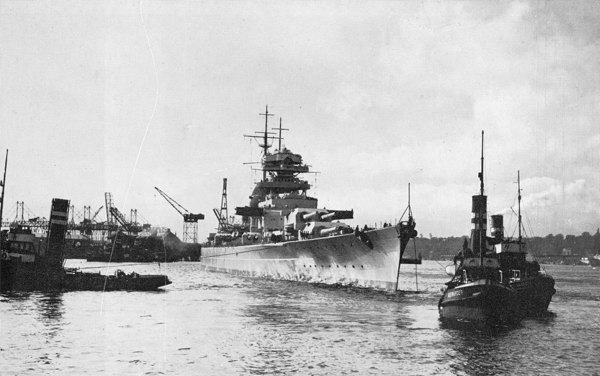 Bismarck Underway. The battleship Bismarck en route to Brunsbüttel roads on 15 September 1940.
Bismarck Underway. The battleship Bismarck en route to Brunsbüttel roads on 15 September 1940. 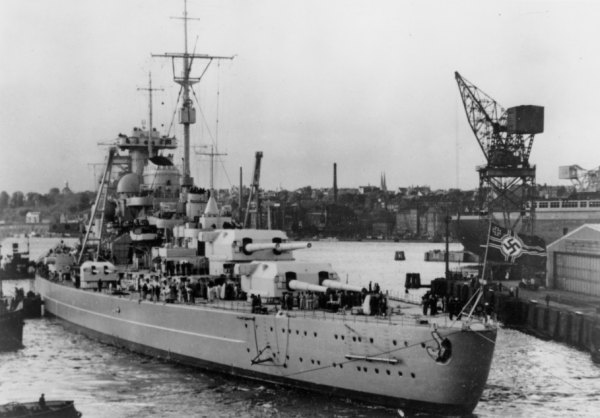 Bismarck Leaving the Shipyard. The battleship Bismarck leaving the Blohm & Voss shipyard in Hamburg on 15 September 1940.
Bismarck Leaving the Shipyard. The battleship Bismarck leaving the Blohm & Voss shipyard in Hamburg on 15 September 1940.
Just found a REAL GEM!
The F.d.U./B.d.U.’S War Log !!
German Naval War Log Entries For 15 September, 1939
U 31 reported in radio message 0700: “Convoy in square 1253, main course 2400, speed 10 knots.” That is off the Bristol Channel. This is the first clear report of a convoy. The boats in the neighboring areas U 34, 29, 53, should now operate against the convoy - they may have luck. I have dinned it into the C.O.s again and again that they must not let such chances go by. It is not possible to do anything from this end.
In any case the boats must now be nearly at the end of their fuel. If only there were more boats at sea now! Nevertheless I still think it was right to recall the boats - without then there would be a complete lack of U-boats by the beginning of October, and by then there should be more traffic.
So U 31 got through the Channel and had different experiences than U 35. This shows that it is possible to pass through the Channel, even if not in all circumstances as is shown in the case of U 35. I do not intend to use the Channel as the normal route.
In the course of the day U 46, 47 put into Kiel, U 37 into Wilhelmshaven.
U-47 Reports that she has sunk:
S.S. Bosnia 2407 BRT 3200 tons Sulphur
Rio Claro 4086 BRT 4777 tons mixed cargo
Gartavon 1777 BRT 2900 tons ore
The boat was in her operations area for 4 days (3 - 7.9) after the outbreak of war. A very nice beginning. U 37 and 46 no success - bad luck. Further details will have to be gathered from the C.O.’s reports. The disposition of the next series of boats is under constant consideration; they must destroy a convoy.
The Belgian S.S. Alex von Opstal is said to have been torpedoed by a U-boat near the Shambles. Her position is within the area fouled by U 26. Numerous radio intelligence reports received point to an increase in convoy traffic. Since 13.9 no more steamer rendezvous have been published in the Bristol Channel. This also points to the convoy system being perfected.
Towards evening U 45 entered Kiel. No success, as her position seems to have been outside the areas frequented by shipping.
(signed): Dönitz
Captain
B.d.U
VERY interesting first-hand account of the 35th Panzer Regiment’s (4th Panzer) dash in to the suburbs of Warsaw, on around 14-15 September.
It’s a passage from the book “Panzer packen Polen”, translated by Colonel E. M. G. Montfort, in Revue Militaire Suisse, January 1941.
“Attack ! We, the men of the armored divisions, knows what that means. It is the purpose of our existence. Several times already we have attacked successfully over open ground. “But today there is something new. We are before a city of 1,300,000 inhabitants into which a penetration must be attempted. “Air reconnaissance has disclosed that strong barricades have been erected to bar our entrance into the city.
Also we are naturally expecting the necessity of having to fight from street to street. “Our Panzer troops spend the night before the attack under the Walls of the city, in well-protected bivouac, with firing positions organized on all sides. The guard, is relieved frequently, for we do not want to be surprised. From time to time we send a greeting to the city in the form of a shell which bursts afar.
“Five o’clock ! A disagreeable night has finally passed. The company commander returns from the group commander’s headquarters, where orders have been distributed. He calls the section leaders together to acquaint them briefly with the situation, and to give them orders for the attack.
“1‘ am ( Sergeant-major Ziegler) chief of the company command group, and I make up a combat crew, in my tank, with the driver and the radio telegrapher. My mission, with two other tanks, is to protect the company commander and, if necessary, establish liaison with the sections, or reconnoiter.
“Six o’clock ! Moving into place near the line of departure. A faint feeling of apprehension: no unnecessary words are exchanged; only a few brief orders to the driver and the telegrapher interrupt the silence. 1 look out from the interior of the turret, Behind me my good motor throbs and high in the air a few shells whistle. The plan of combat for the company and the order of attack arrive by radio. Our’ nick.name is ‘Buzzard’; and the last words of the order are:
Buzzard’ to the combat. March!’
“The tanks roll along. In front of me the company commander. We cross a high barricade to the left. Our sections are visible in the gardens in front of the houses to the left and right. Rifle and machine.gun fire burst forth:
but that hardly disturbs us, accustomed as me are to the sharp sound of bullets which ricochet off the turret We search carefully for the spots from which this firing comes, and we respond to it, suddenly the section leader of the first echelon reports:
Two tanks disabled!, Immediately the company commander orders the following section to push forward. This one in its turn is stopped shortly afterward. why? I do not know, I shall learn much later that It passed over mines.
.’Everything vibrates in me; apprehension has disappeared, and the good Stimmung’of attack is created. I ask the company commander for permission to take command of the rest of the sections of the first echelon, because the tank of the Second Section leader, which also hit a mine, has over turned.
“Authorization to push forward is granted to me, and I roll forward, Ordering the other tanks to follow me rapidly, Trees, little houses, and barricades are crushed, and the first street has been crossed. As we draw near we see everywhere sharpshooters, trenches and breastworks; but they have been immediately abandoned by the Poles, so great is their fear of our tanks. Perhaps they didn’t expect to see us arrive from across a mine field. During all this time the fusillade which is mining down on us from the houses has not ceased. I have my eye at the observation slit and, aided by the driver, I seek the proper road to follow.
“We begin to feel the heat in the tank. Sweat rolls down our faces, and we breath in lungs-full of powder smoke from cannon and machine-gun fire. That hardly bothers us; our nerves are, too taut. Unfailingly the radiotelegrapher maintains liaison with the company commander who is following. The advance continues steadily between houses and across courts into other gardens. Here too, they shoot at us from all sides. A short halt is made to orient ourselves and to permit liaison with the tanks which are following.
“Two hundred meters in front of me appears the angle of a wooden barricade which could be used for cover. I shout to the driver: ‘Hannes, full speed ahead!’ and point out the direction to him. The motor gives its maximum; I keep up a steady fire during the rush; the barrier is reached.
A glance through the rear observation slit shows me, thirty yards behind, the company commander. The other tanks are not following. ‘They will come,’ I think; and I order my Driver to press on.
“Another 200 yards and we find a street which leads to the center of the city. We want to take it because I envision the swift effect the mass of tanks would produce by attaining this objective. ‘Hit in the openingr cries my driver. An antitank shell has shattered the observation slit of the driver and broken the protective glass. The driver can no longer see I call to him to change the glass, while I feverishly turn the turret and open fire on a wooden shed from which the shell must have come.
.We reach the street. I look quickly behind. Now it is the company commander who is no longer there. In 300 yards three tanks have stopped! Why don’t they come? The radio telegrapher continues uninterruptedly to give the order to advance. Dripping with sweat, seated down below in his corner, he telegraphs and hands me up drums of ammunition.
“My machine-gun Jams, I withdraw the lock; the socket is broken. Quickly I change the gun. I glance through the observation slit and see a civilian running toward us. A sudden movement of his arm—a grenade flies over and bursts on us without doing any damage He doesn’t have time to throw a second one because my gun cuts him to bits.
“Two hundred yards further along, on a railway embankment, about fifty Poles scatter, running. My machine gun fires again. A hail of bullets” mows down the enemy. “During this time my radio telegrapher has been ceaselessly calling the tanks which remained behind. Suddenly tuned on the group frequency, he receives the following order: ‘Take command of the company and push forward!’.
What has happened to the company commander? Has he advanced too far without protection?.
“Two light tanks and one medium tank rejoin me. The order is given them to advance with me, and to push along this street toward the center of the city. At my right is the medium tank; behind me the two light tanks. While spraying suspicious points with lead, I suddenly see, halfway to my left in a garden, a burst of flame and I hear the explosion of a shell. The munition depot of a75-mm gun, which was in position ready to fire on us, has been accidentally hit. The entire gun crew has disappeared.
“And now, directly in front of us, an antitank obstacle looms up. There is no way to avoid it; we must cross it. Carefully, the tank on my right aproaches it and crosses. I concentrate my fire on the obstacle. All hell breaks loose!
In front of us several shells burst in quick succession. The 75-mm gun must now be in position somewhere else. I look for it and fire as hard as I can. While changing a magazine I glance around me. The two light tanks are in flames. Is there another gun behind us? May be it’s an enemy tank or an antitank gun! I haven’t time to think very long. An order is given to the tank beside me to return along the road by which we came; and I fire again at the gun in front of me.
“Before turning, the medium tank received a 37.mm shell in its motor, but the shell did not burst. I grit my teeth and press my head against the gunsight, contracted by my search for the enemy. Incredible luck ! One of the tanks in flames gives forth a smoke which protects me in the rear, while the fire of the enemy in front of me continues to fall short. A shell whistles under the tank, tears out part of the motor chassis, and by its explosion lifts us a trifle off our springs.
“My accompanying tank has disappeared, Now is the difficult moment for us. ‘Turn around and go back !’ The driver turns the tank sharply, and plunges down the street passing burning tanks through clouds of smoke, Another 50 yards to cover before we reach the garden. I shoot continuously, raking the street with fire, From one moment to the next I expect to receive the fatal hit, It does not come.
“We reach the gardens and roll onto the principal street. Back of us we hear only a few gun shots and several bursts of machine-gun fire.
“From behind a bush a comrade, driver of one of the flaming tanks, rises suddenly. I open the turret cover, calls to him, and quickly he jumps to safety in to the tank onto the knees of the radio telegrapher.
“A burning doorway bars our path. My driver stops just in front of it; aims directly for it; and at one rush the door flies to pieces. Finally we reach the main road. Several tanks of our group are already assembled here. From the town comes a steady artillery fire which has put several tanks of our regiment out of action by direct hits.
“My turret no longer turns, Perhaps it is owing to the shock of hitting the doorway, or the result of the quantity of bricks which fell on us during the trip between the houses. Upon lifting the turret cover to see better, I observe nearby my company commander leaning against the corner of the house. Impassively, he is defending himself, pistol in hand, against enemy riflemen who are occupying the windows. He, too, jumps into my tank, and we are even more crowded than before, The turret damaged, five men in the tank—
battle is hardly an easy matter for us!.
“During the return trip, the company commander told me that his tank was put out of action and his radio telegrapher wounded. He sent the wounded man to the rear, accompanied by the driver, while he remained forward and continued to tight with his pistol,.
“Finally we reach our original line of departure, Some comrades are already there. Their tanks were destroyed by guns or mines, and they returned on foot, They inform me that one of my men is dead, burned in one of the tanks which took fire behind me. His wounded driver was picked up.
“Several tanks of the group come up from behind in perfect order.
“The attack lasted five hours. It failed on account of the city’s powerful defense. ”

Perhaps a typical Nazi Prussian German general?

"In September 1939, von Reichenau commanded the 10th Army during the invasion of Poland. In 1940 he led the 6th Army during the invasion of Belgium and France, and in July Hitler promoted him to field marshal.
Barbarossa
"During the invasion of the Soviet Union in June 1941, von Reichenau again commanded the 6th Army, which captured Kiev and Kharkov.
"Politically, von Reichenau was an active anti-Semite and supported the work of the SS Einsatzgruppen in exterminating the Jews in the occupied Soviet territories. He encouraged his soldiers to commit atrocities against the Jews, telling them: "...In this eastern theatre, the soldier is not only a man fighting in accordance with the rules of the art of war...For this reason the soldier must learn fully to appreciate the necessity for the severe but just retribution that must be meted out to the subhuman species of Jewry...".
"During the offensive, Reichenau inspected every single Russian tank he came across. He would enter each tank and, using a ruler, he would examine the thickness of the armor. Upon examining a T-34 Tank, he told his officers, "If the Russians ever produce this tank on an assembly line, we will have lost the war."
"A few historians such as Walter Görlitz have sought to defend von Reichenau, summarizing his October 1941 "Reichenau Order" as "demanding that the troops keep their distance from the Russian civilian population."
"On 19 December 1941 Hitler sacked Walther von Brauchitsch as Commander-in-Chief and tried to appoint von Reichenau to the post. But again the senior Army leaders rejected von Reichenau as being "too political" and Hitler appointed himself instead.
"In January 1942 von Reichenau suffered a cerebral hemorrhage, and it was decided to fly him from Poltava to a hospital in Leipzig, Germany. He is often said to have been killed in a plane crash in Russia, though Görlitz writes that the plane merely made an emergency landing in a field, and that von Reichenau actually died of a heart attack."
September 15, 1939-The Battle of Jaworow, Near Lvov
The SS SS-Standarte Germania Regiment had been ordered to advance in to the villages of Przelbice, Muzylowice, and Czarnokonce. The SS had been ordered to close the roads leading east and prevent Polish troops from reaching Lvov.
The Headquarters Detachment and one battalion of SS Germania stopped in Muzylowice for the night, as well as parts of several support units from other regiments. The Krad(Motorcycle) Company was posted to another village, approx. 2 mile futher down the road.
Late in the night, the Polish 49th Hutsul Rifle Regiment and the 98th Infantry Regiment of the 38th Reserve Division, and units of the 11th Carpathian Division, advanced on the Germans, with unloaded weapons, bayonets, and in complete silence. They overtook and completely destroyed the Krad Company, without alerting the SS Germania pickets in Muzylowice.
The Poles then advanced to within earshot of the town, and with orders not to load their weapons until after combat had begun for complete silence, charged in to the sleeping Germans.
It was complete chaos, and the SS were taken completely by surprise.
FROM WIKI:
After 30-minutes of fierce hand-to-hand combat, which started at 9 pm, the Germans suffered heavy casualties, with at least 205 KIA and WIA. The commander of the III battalion SS-Obersturmbannführer Willy Koeppen and the regiment’s aide-de-camp SS-Obersturmführer Schomburg were among those killed by bayonets.
The regiment’s HQ fled to Jaworow and German soldiers scattered in panic across the area. Several prisoners were taken and the SS lost almost all of its heavy equipment, including 16 75mm artillery pieces, 8 105mm artillery pieces, 15 AT guns, the majority of mortars, plus all vehicles (20 armored vehicles and transporters, 70 motorcycles, 50 trucks and cars).
The Poles lost 32 men, mostly by friendly mortar fire.
SS Germania was basicly knocked out of the campaign by these losses, but strategicly, the battle made no difference at all for the outcome, as the Poles weren’t organized enough to take any advanyage of it.
Disclaimer: Opinions posted on Free Republic are those of the individual posters and do not necessarily represent the opinion of Free Republic or its management. All materials posted herein are protected by copyright law and the exemption for fair use of copyrighted works.